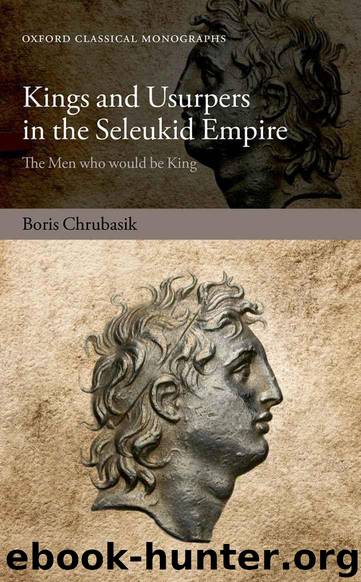Kings and Usurpers in the Seleukid Empire (Oxford Classical Monographs) by BORIS CHRUBASIK

Author:BORIS CHRUBASIK
Language: eng
Format: azw3
ISBN: 9780198786924
Publisher: Oxford University Press
Published: 2016-10-20T06:00:00+00:00
Difference and distinction also became apparent in Tryphon’s royal epithet. Tryphon’s royal title on his coins was βασιλεὺς Τρύφων Αὐτοκράτωρ in the genitive.118 The epithet is highly unusual and is presumably neither connected with either Seleukid or Ptolemaic usage of the title of stratēgos autokratōr, or with the Greek form of the Roman imperator, for which evidence is lacking before 69.119 Instead Parthian usage before Tryphon’s reign may provide some comparative evidence for the origins of the title.120 Given the geographical distance of the Parthian sphere of influence from the Levant, it should not be assumed that it was the Parthian usage of the epithet that influenced Tryphon’s choice. Instead, both rulers referred to similar semantics in their differentiation from the Seleukid kings.121 Of course, a wide variety of military epithets were available, but many of them, such as Nikatōr, Kallinikos, or Sōtēr would have referred to the Seleukid dynasty. Tryphon’s epithet, however, emphasized his own achievements. Differentiation between Tryphon and the Seleukid kings is also apparent in his decision to break with the Seleukid era and to use his own regnal years.122 While we simply do not know whether other usurpers introduced their own regnal years, Tryphon’s kingship in a region where it had become usual to put the regnal years on the issued coins signifies a conscious rupture.
The theme of differentiation continues in the imagery on Tryphon’s coinage. It largely depicts variations of one portrait on the obverse and two reverse types that both carry the name of the king. The prominent reverse type depicts the aforementioned Boiotian helmet.123 The portrait depicts a man with a ‘Greek nose’,124 an emphasized supraorbital ridge, a thick neck, with his face turned to the right side and slightly razed. His round cheeks and the fold of his neck beneath the Adam’s apple give him a slightly chubby appearance. There is no particular emphasis on muscles or other facial features thereby giving the face a more idealized demeanour. The most dominant element in this portrait is the hair: it falls in long waves, leaking over the diadem, and is swept behind his ears, nearly reaching his shoulders (see Fig. 3.7). Both the facial expression and the wild hair were later adopted by Seleukid and other monarchs, including Antiochos VII, Antiochos VIII, and Mithridates VI of Pontos.125
Fig. 3.7 Tetradrachm of Tryphon, mint Antiocheia/Orontes, c.142–138 BCE, CSE II 563. Courtesy of Arthur Houghton.
Download
This site does not store any files on its server. We only index and link to content provided by other sites. Please contact the content providers to delete copyright contents if any and email us, we'll remove relevant links or contents immediately.
| Africa | Americas |
| Arctic & Antarctica | Asia |
| Australia & Oceania | Europe |
| Middle East | Russia |
| United States | World |
| Ancient Civilizations | Military |
| Historical Study & Educational Resources |
Mythos (2019 Re-Issue) by Stephen Fry(1565)
Alexander the Great by Robin Lane Fox(1357)
On Sparta (Penguin Classics) by Plutarch(1188)
Antigone Rising: The Subversive Power of the Ancient Myths by Helen Morales(1139)
Persian Fire by Tom Holland(1080)
The Last Days of Socrates by Plato & Christopher Rowe & Plato(1014)
The Classical World: An Epic History From Homer to Hadrian by Robin Lane Fox(1006)
Cicero by Anthony Everitt(987)
The Athenian Constitution (Classics) by Aristotle(940)
Antigone Rising by Helen Morales(841)
The Greek World(817)
The Riddle of the Labyrinth(816)
The Story of the Greeks (Yesterday's Classics) by Guerber H. A(796)
The Homeric Hymns (Penguin Classics) by Homer(754)
The End of the Bronze Age by Robert Drews;(744)
The Eudemian Ethics (Oxford World's Classics) by Kenny Anthony(741)
Guide to Greece by Pausanias(726)
A History of My Times (Classics) by Xenophon(703)
Lords of the Sea: The Epic Story of the Athenian Navy and the Birth of Democracy by John R. Hale(701)
